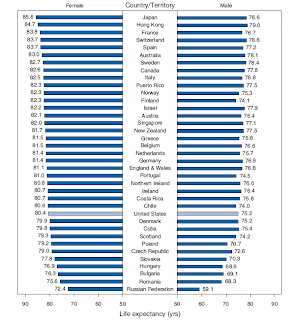I have an idea on how to measure the impact that stuttering has on a stutterer's life. We could look at what age they die, and then compare the distribution with that of the same population. Age is probably the best indicator of quality of life overall. My guess is that there is little difference between people who stutter and fluent speakers, but it would be worth the effort to find out.
Of course, we male stutterers already know that we will unfortunately die 5 years earlier than our fellow female stutterers who according to urban myth are suffering significantly more discrimination than men and therefore by twisted feminist thinking are not actually enjoying better quality of life overall but are forced by (male) society to live much longer so that they can be discriminated much longer! ;-) However, age as the best indicator of life quality to show discrimination by race (e.g. African Americans die earlier) is of course again valid, just don't do it for sex!

3 comments:
Tom,
If you are interested in quality of life measures, Paul Dolan is the expert. You heard him at Oxford this year. Additionally, there is a paper by Boothe et al from a year or two ago in JSLHR
I love statements like "X is the expert"! I prefer to look at the research itself. I have talked to too many experts...
Paul Dolan did an excellent job in introducing important concepts of health economics to the audience, but he has definitely not shown how he adjusts these concepts to stuttering. That was most likely not the aim of his talk, but I like to see more concrete work after his lecturing before making a statement. I haven't see any article from him.
I work in finance / risk management which is quite similar to economics, and there is a big gap between lecturing about concepts and real-life implementation for real use.
I am especially wondering how he deals with treatment choices "certain costs for uncertain benefits" which is different to common operations with "certain costs for certain benefits".
Re Boothe, no I haven't read her work. Too limited time and no direct access to articles.
what about wealth. you considered heatlh, by age of death
Post a Comment